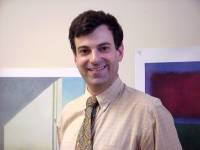Newsroom Archive

New York, NY, April 7, 2008 -- John Matteson, Associate Professor of the English Department at John Jay College of Criminal Justice, was awarded the 2008 Pulitzer Prize in biography for his book Eden’s Outcasts: The Story of Louisa May Alcott and Her Father, which chronicles the relationship between the celebrated author of Little Women and her father Bronson Alcott. Other biographers have examined the lives of Louisa May Alcott and her father individually. Eden’s Outcasts is the first book to look at their lives jointly.
When asked to comment about his winning the award, Matteson said that he could best describe his feelings in the words of John Steinbeck when he won the Nobel that he felt “wrapped and shellacked.”
“I am extraordinarily pleased,” said Matteson. “I am so thankful to have been able to do this with and for John Jay College. They hired me when no one else would and have supported me through thick and thin.”
Jeremy Travis, President of the College, said, “This is a stunning achievement by a prominent member of our faculty. And, we are delighted to join the world in its celebration of Professor Matteson’s talents.”
Prior to the Pulitzer, Eden’s Outcasts had been named as one of the best books of 2007 by both the Christian Science Monitor and the St. Louis Post-Dispatch.
Matteson, who has taught literature and legal writing at John Jay since 1997, holds a PhD in English from Columbia University and a law degree from Harvard Law School. A paperback edition of the book is due out later this year. Matteson will also be serving as a consultant and on-air commentator for a forthcoming PBS documentary on Louisa May Alcott.
Professor Matteson is the second John Jay College faculty member to win a Pulitzer Prize. The other was Professor Michael Wallace, who won in 1999 for his book Gotham: A History of New York City to 1898.
About John Jay College of Criminal Justice: An international leader in educating for justice, John Jay College of Criminal Justice of The City University of New York offers a rich liberal arts and professional studies curriculum to upwards of 14,000 undergraduate and graduate students from more than 135 nations. In teaching, scholarship and research, the College approaches justice as an applied art and science in service to society and as an ongoing conversation about fundamental human desires for fairness, equality and the rule of law. For more information, visit http://www.jjay.cuny.edu/.
 Inside JJC (Faculty & Staff)
Inside JJC (Faculty & Staff) Technology Services Status
Technology Services Status

